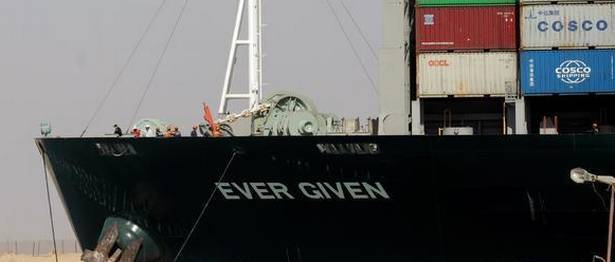
Suez Canal blockage to have ripple effect on the container trade
Will aggravate the already global container imbalance and increase freight rates in the coming days
It was a big relief for the global maritime trade as the container ship ‘Ever Given’ that blocked the critical Suez Canal for six days was successfully refloated on Sunday. But the blockage is going to have a ripple effect on the container trade, aggravating the already global container imbalance and increase in freight rates in the coming days.
The Suez Canal is an important maritime link providing the shortest sea link between Asia and Europe. Nearly 12 per cent of global trade passes through the Suez Canal. Every day, 50 cargo ships pass between the Mediterranean and the Red Sea, providing a vital trade corridor between Europe and Asia.
Due to the blockage, over 350 ships, including a large number of container vessels, are at anchorage to pass through the canal. The global container capacity is around 24 million TEUs (twenty-foot equivalent units).
Cargo delays
Lars Jensen, a leading expert in the container shipping industry, based in Denmark, in his LinkedIn post a week ago said that blockage could cause the delay of 1,10,000 TEUs of cargo. It simultaneously delays the movement of 55,000s TEU of containers back to Asia per day – further adding delays to getting empty containers available in Asia. Adding to this the impact on Asia-USEC and Mid-East/India to Europe services via the Suez Canal, he said.
As the container imbalance caused by the Covid-19 pandemic was settling down, the blockage has aggravated the situation. “We can expect freight rates to increase soon,” said G Raghu Shankar of the Chennai-based International Clearing and Shipping Agency.
Also read: Suez Canal reopens after stuck cargo ship is freed
Global shipping lines have already indi cated that the blockage is likely to have a ripple effect on the container trade.
Firms’ advisory
In an advisory, the Danish shipping line Maersk said that even when the canal gets reopened, the ripple effects on global capacity and equipment are significant and the blockage has already triggered a series of further disruptions and backlogs in global shipping that could take weeks, possibly months, to unravel.
Currently, Maersk and partners have three vessels stuck in the canal and 29 vessels waiting to enter the canal, with more expected to reach the blockage today. It has redirected 15 vessels around the Cape of Good Hope at the southern tip of Africa. These decisions were made close to the point of no return and it is expected that they will continue via the south of Africa, also to reduce the number of vessels in the queue, the Line said.
Assessing the current backlog of vessels, it could take six days or more for the complete queue to pass. As more vessels either reach the blockage or are redirected, this is an estimate and is subject to change.
CMA-CGM of France said that as of March 27, nearly 20 ships, including that of partners, are stuck at the canal.
Mediterranean Shipping Company, a Swiss-Italian international shipping line, says that the incident is to have a very significant impact on the movement of containerised goods, disrupting supply chains beyond the existing challenges posed by the Covid-19 pandemic.
Due to the blockage, many ships have been rerouted around the Cape of Good Hope. However, this will cost the lines dearly as the 9,000 km diversion will take seven to 10 days longer and adds a huge fuel bill to the trip between Asia and Europe. The additional bill will have to be borne by consignees, said experts.
Source:BL

